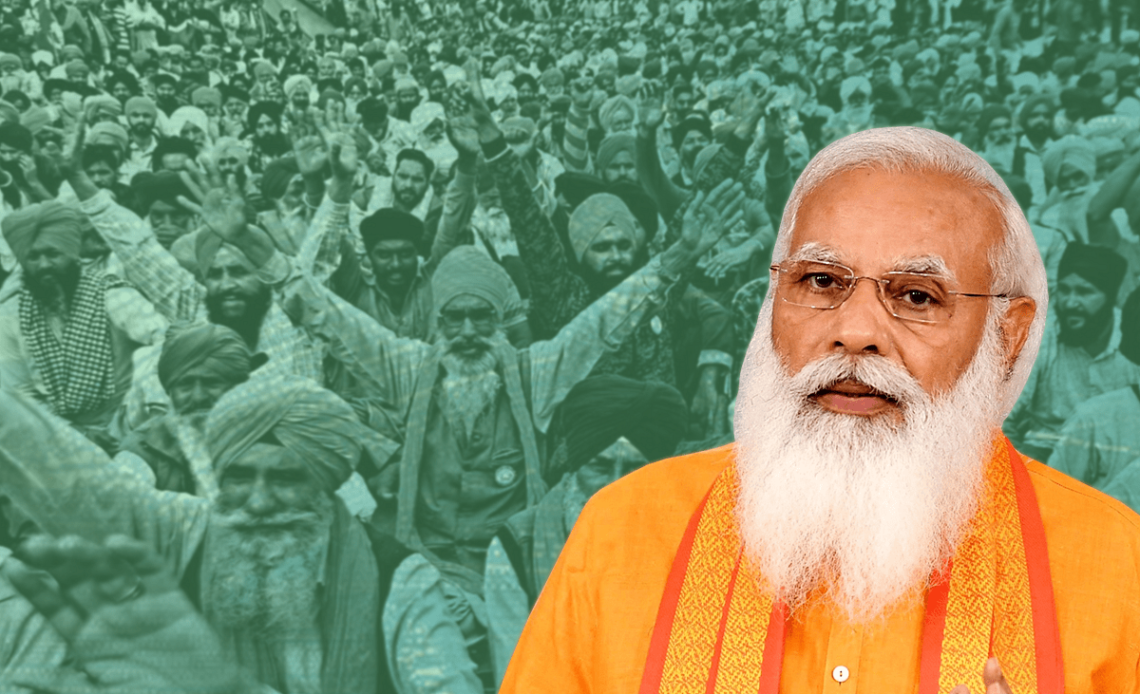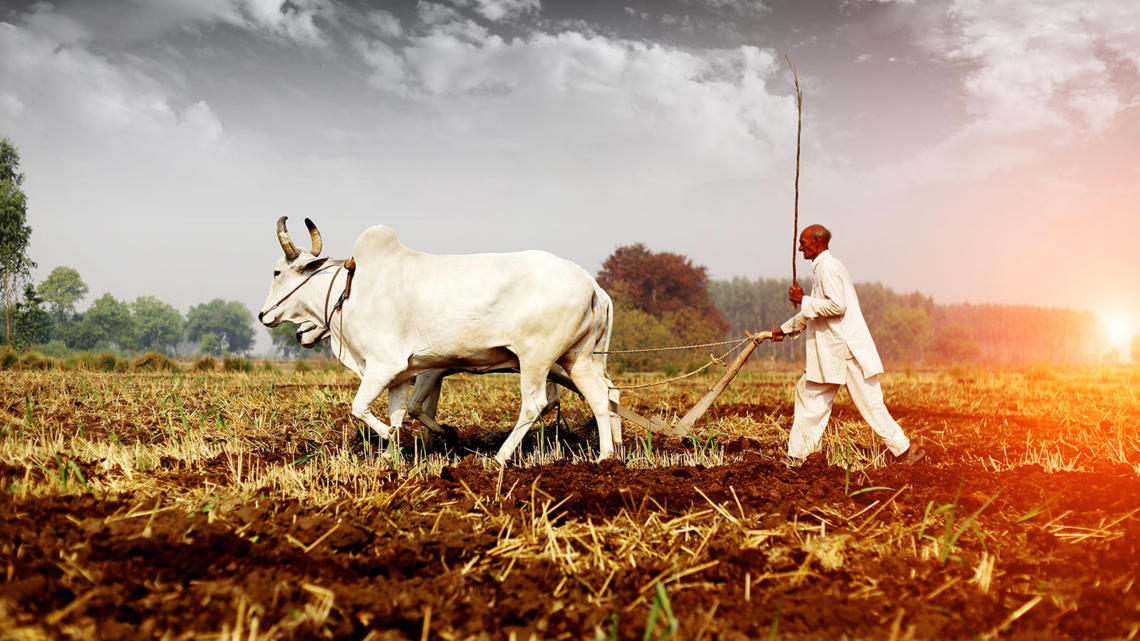
The farm laws have been repealed. This has come as a complete surprise because this was only the second decision that was pulled back by this government. On one hand, some are calling it an Election Masterstroke, while on the other hand, some are calling it the victory of Farmers. Let’s dig deeper into all the concerning aspects to get a better idea.

See…first of all we need to look at what were the reservations of the farmers on these laws:
- Losing Control: The biggest worry for the farmers was that once corporate farming starts, the whole control would come up in the hands of big corporate houses only. There is no way in which farmers will themselves be able to negotiate with big houses. And they will be forced to accept whatever is given to them. The biggest losers would have only been the small farmers as they could have lost their whole land.
- The ADANI Case: Farmers repeatedly pointed that big houses will purchase their harvest at some 10 rupees and sell it for 100 at the market. The majority of the profit will be reaped away by the big houses. Similar complaints came that Adani Agri Fresh purchased apples below 72 rupees but sold them in the market at above 350. If that would have to be the norm, the whole profits would have been reaped by big corporate houses.
- Other Examples: Another point of objection by the farmers was that those states who don’t have this system are the worst in terms of farmers. Punjab and Haryana still have the APMC system and they possess the most prosperous farmers in the country. While states like Bihar, which have come out of the APMC system back in 2006, are home to the poorest farmers in the country.
But, everything is not white and black in life, there also exists some Grey areas and this situation is darker than ’50 Shades Of Grey’. You believe it or not there ARE some positive things associated with the bill which were aimed towards solving the drawbacks existing in Indian Agriculture.
- Flawed Structure: Our agriculture system is extremely flawed. While more than 50% of our population is involved in agriculture, it hardly contributes some 15-20% to the GDP. There should be no surprises as, why our farmers are so poor. The farmers absolutely have no idea about what should they be producing based on the demand and supply chain at the market. They simply produce what they find easy to produce. It leads to the over-production of wheat, rice and sugarcane. Not just it reduces the eligible price of that crop but also makes it difficult for the government to provide the farmers with MSP.
- No Big Capital: If you look at other countries, you will find them running big global brands in fruits, vegetables and dairy. The main reason behind this is we don’t have any framework which can facilitate big capitals to enter the sector. I mean…without that, how can it be even possible to expect the farmers to make a big income from agriculture. Not just that, if private and foreign capital enters into the market, then it will also lead to better price discovery. There is no reason why we should be purchasing so expensive milk despite being the world’s largest milk producer. We also pulled out of RCEP.
- Land Quality: Now, I know this point may not sound that too powerful to many, but it also needs to be looked at. There are a couple of crops that seriously damage the quality of the soils. The reason for that is sugarcane demands an intense supply of water and chemical fertilizers. The soil acidification due to the fertilizers used during this adversely affects the soil. Private Capital can help in maintaining this damage as it will control the excessive sugarcane production and will bring in a balanced price.
Why did the Government have to step back?
The answer is as simple as one-word ELECTIONS. BJP is an Election Machine and it can’t afford to go into an election with any weakness as big as this. This Farm Protests had almost ended BJP’s chances in Punjab and could have also made some dent in Western Uttar Pradesh. Even though BJP seemingly has an edge in UP, but that state is something BJP can’t take even the slightest of risk. Now, after this BJP has also entered the ring in Punjab in a three-way battle under the ‘Captain’.
Also, our prime minister was not happy with the Anti-Sikh image of him that was slowly getting built. There were no surprises into why did he choose Guru Parab to make this announcement. The ‘Maafinama’ Tapasya’ and ‘Dipak’ were just cherry on top helping him to showcase his affection for the farmers, which was missing for the past one and a half years. Lastly, if anyone thinks that they can push this government back even on Article-370 and CAA, then he is wrong. Both the law primarily affect Muslims, which even BJP has no interest in having as vote banks. But, here it was farmers, something no one can afford to lose.

Where the Government went Wrong?
Well…if you ask me the government went wrong on not one but multiple fronts. Firstly, before bringing such a big change, one should have discussed it with the farmer unions. It would have helped them to know about the problems of farmers in greater detail. Also, the farmers could have told them about the possible solutions and their concerns. This had surely avoided so much havoc. But, this government is immune to counter-arguments. Simply, out of their self-ego, they made a whole set of laws for the farmers without even talking with farmers.
Secondly, the big mistake of this government was to pass the laws unconstitutionally. We all saw that how the bills were passed through voice vote. I mean…this is simply not the way to pass a law in a democratic country like India. It again sparked another set of outrage and resistance against the bills, which could have been easily avoided if the proper procedure had been followed
Thirdly, and most importantly, once the farmers started protesting against the laws, the government straightaway took them as their enemies. They were labelled as ‘Terrorists’, ‘Anti-Nationals’ and ‘KHALISTANIS’. Our GODI MEDIA and IT Cell simply amplified this name-calling. The only thing it did was worsen the situation to such a point, from where it was just This Way or That Way. When foreign personalities supported the farmers, our government had a whole ‘Internal Matter Gang’ ready with their tweets.

A Salutory Note to Farmers
Now, when we have to the end of this chapter, we need to take a look back at this whole movement. Now, whatever be your stand, you can’t resist acknowledging the will and determination. These farmers stood with their movement irrespective of whether it was hot, cold or rain. The government initially tried to stop them by digging the roads and placing barbed wires and barricades. They used water cannons and even lathi-charged them brutally. If all this was not enough, they stooped down the level by blocking food and water supply. All this while, the narrative of the movement being a funded one kept on being amplified by the government.
There were several ups and downs in the movement as well. Whether it was the 26th January incident or the killing of a man at the Delhi-Haryana border. Even the incident at Lakhimpur Kheri could have been a huge setback for the movement. But the farmers stood there beating all odds. There is a reason why this is being termed as the biggest national-level movement since Independence (1947 coz some people don’t know). After all, they are farmers and they know standing up against all odds. So, hereby I salute all the farmers and also pay my tributes to more than 700 farmers who lost their lives.

Conclusion: This should not be the End
This movement has won but the reforms should not lose. I already pointed out how badly we need reforms in the agricultural sector. This could have been the very start in that direction. But, I also pointed out where did the government went wrong. These laws needed better planning, better communication and definitely better implementation. Anyways, the Farm Laws would have been of no use if farmers were ready to die to not accept them. Here, we should acknowledge the courage of this government in bringing such reforms.
But, we need to accept the fact that we need some reforms in the agricultural sector and many of those laws will not be acceptable to the farmers. That’s why I am saying that the only way to bring these reforms is to have a consensus built among the farmers. According to me, this is a big opportunity missed but it should not be the end. If not at the national level, the government should try to bring in these reforms slowly at the state level. But this should not stop and instead should be taken as a lesson.
JAI JAWAN JAI HIND
ARUNESH

